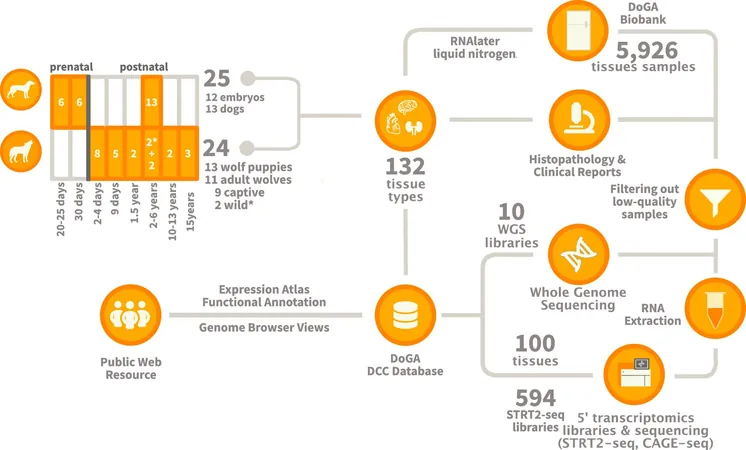
Groundbreaking Canine Gene Research Database Unlocks Secrets of Hereditary Diseases!
2024-11-11
Author: Siti
Researchers have just made an extraordinary leap forward in the field of genetics with the introduction of a groundbreaking international canine gene research database. The International DoGA Consortium has unveiled a comprehensive canine promoter and gene expression atlas that is set to revolutionize our understanding of hereditary diseases—not only in dogs but across multiple species.
This innovative database meticulously outlines which genes are active in various parts of the body and the precise timing of their activation. With this knowledge, scientists can delve deeper into how genes operate in different scenarios and the significant impact they have on health and the onset of diseases.
Professor Hannes Lohi, a leading researcher from the University of Helsinki's Faculty of Veterinary Medicine, emphasized the importance of this achievement, stating, "This new international database is a significant advancement for genetic disease researchers. Our comprehensive resources will be invaluable for unraveling gene regulation and will benefit the scientific community for years to come."
The DoGA atlas was developed through an impressive collaboration of experts in genomics, veterinary medicine, and computational biology from around the globe. The results of their work have been published in the prestigious journal *Nature Communications*.
The team collected over 5,000 samples from a diverse array of dog breeds and even wolves, employing cutting-edge RNA sequencing techniques to create an intricate map of gene expression and promoter structures. This effort marks a substantial enhancement in the canine gene map, outperforming similar research done on common model organisms like mice and zebrafish.
A Game-Changer for Future Medical Research!
The implications of this research are immense. The DoGA database not only paves the way for dogs to serve as a key model for studying human health but also directly facilitates investigations into canine genetics. “With this resource, we've created an invaluable tool that allows researchers to explore various applications, from embryonic development to identifying disease gene expression across different tissues, and even the genetics behind behavioral traits,” explained Ph.D. Matthias Hortenhuber from Karolinska Institutet in Stockholm.
What makes this initiative even more remarkable is that the DoGA database is fully open and interactive, giving the scientific community access to a detailed gene atlas. Researchers can now examine gene expression across a range of tissues, which is critical for identifying hereditary factors linked to diseases. This research serves as a bridge between humans and dogs, with the potential to improve understanding of complex conditions like cancers, epilepsy, and psychiatric disorders.
As we stand on the brink of a new era in genetic research, the DoGA database represents a monumental step forward in our quest to unravel the mysteries of hereditary diseases that affect both dogs and humans alike. Stay tuned as this incredible resource continues to evolve and inspire further breakthroughs in genetic health research!
 Brasil (PT)
Brasil (PT)
 Canada (EN)
Canada (EN)
 Chile (ES)
Chile (ES)
 España (ES)
España (ES)
 France (FR)
France (FR)
 Hong Kong (EN)
Hong Kong (EN)
 Italia (IT)
Italia (IT)
 日本 (JA)
日本 (JA)
 Magyarország (HU)
Magyarország (HU)
 Norge (NO)
Norge (NO)
 Polska (PL)
Polska (PL)
 Schweiz (DE)
Schweiz (DE)
 Singapore (EN)
Singapore (EN)
 Sverige (SV)
Sverige (SV)
 Suomi (FI)
Suomi (FI)
 Türkiye (TR)
Türkiye (TR)